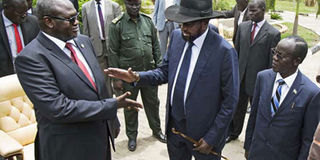Wars have changed and we need new thinking about how to bring peace

Front, left to right: South Sudan's First Vice-President Riek Machar, President Salva Kiir and Second Vice-President James Wani Igga at the Cabinet Affairs Ministry in Juba on April 29, 2016. PHOTO | ALBERT GONZALEZ FARRAN | AFP
What you need to know:
- Acceptance of a truncated territorial authority seems to be the product of the wars we fight among ourselves.
- When it was the European colonialists, it was “us all” against “them” and this shaped the texture of the nationalism of the time.
Former South Sudan first vice president-turned-rebel Riek Machar has called for an armed struggle against the government of President Salva Kiir.
He issued a statement at the weekend following a meeting in Khartoum of his Sudan People’s Liberation Movement in Opposition.
The party signed a peace deal with South Sudan’s government in August 2015 but implementation was delayed and largely fell apart after the sides clashed in the capital in July.
The statement put paid to the hope that after Machar fled Juba in July, things might calm down in a conflict that has killed more than 300,000 people and displaced nearly two million.
There is something about the conflict in South Sudan that should tell us that in this era, wars have changed and we need new thinking about how to bring peace.
When you drive on Kenya’s and Uganda’s roads, you see these big expensive four-wheel drive cars with South Sudan number plates. Some belong to Kenyan and Uganda expatriates and international organisations that decamped from South Sudan once it fell off the wagon again.
But informed sources say the majority, and the very expensive ones, belong to South Sudan’s opposition figures, but mostly regime figures who have taken their children and many wives out of harm’s way.
The recent report by the investigations project The Sentry detailed how many of these South Sudanese are able to keep up this very expensive lifestyle abroad – by looting their country.
The result is something we have not witnessed before. You have a situation where regime figures and the armed opposition are living large in the same cities.
LIKE THIS
It never used to be like this. A country like Uganda had its years of rebellions, with many dissidents living in the region. It is inconceivable that they would have been driving $100,000 cars and buying $2 million houses in Lavington in Nairobi or in Dar es Salaam, where many of them lived.
The primary reason was that they did not have the money. What happened in South Sudan is that a section of the opposition was in a corrupt government and withdrew with their loot.
But an ideological shift that has been under way for some years in Africa, and seems to be maturing, also happened.
It is increasingly acceptable for government leaders, as we have seen even in the case of Somalia, to withdraw with a portion of their government and live openly with the trappings of office in a neighbouring country.
Even up to two decades ago, because the more highly ideological concepts of sovereignty were still deeply entrenched, that would have been considered abdication and would not stand. To the old nationalists, total control of a country’s territory was central to their view of power.
Today, a government can function perfectly, both nationally and internationally, in Mogadishu even though Al-Shabaab still controls portions of the country.
This is because, internationally, the notion of qualified territorial control has also become normalised, otherwise, for example, the Americans could never have supported governments in Baghdad and Kabul even though they did not dominate the rest of the countries.
LITTLE CONTROL
For many years (and to this day), in the Democratic Republic of the Congo, the government in Kinshasa exerted little control over the eastern part of the country, with opposition groups and rebel groups from countries such as Rwanda and Uganda, being able to function autonomously there, trading in illicit minerals, timber, and poaching. This has impacted how peace deals are negotiated. Indeed, the negotiation of the Sudan peace process in Nairobi of the early 2000s that led to the end of the war and eventually the birth of an independent South Sudan, is symptomatic.
While there is still some focus on sharing power at the centre, increasingly, settlements are being made to cede authority to rebel groups over the regions where they are in control. Thus the charismatic South Sudan nationalist leader John Garang became first vice-president of Sudan from July 2005, but president of South Sudan, until his death in a helicopter crash some weeks later.
This acceptance of a truncated territorial authority seems to be the product of the wars we fight among ourselves. When it was the European colonialists, it was “us all” against “them”, and that shaped the texture of the nationalism of the time.
People like Julius Nyerere would never have overseen something like Sudan's Comprehensive Peace Agreement.
Charles Onyango-Obbo is publisher, Africapedia.com and Roguechiefs.com.
Twitter: @cobbo3





